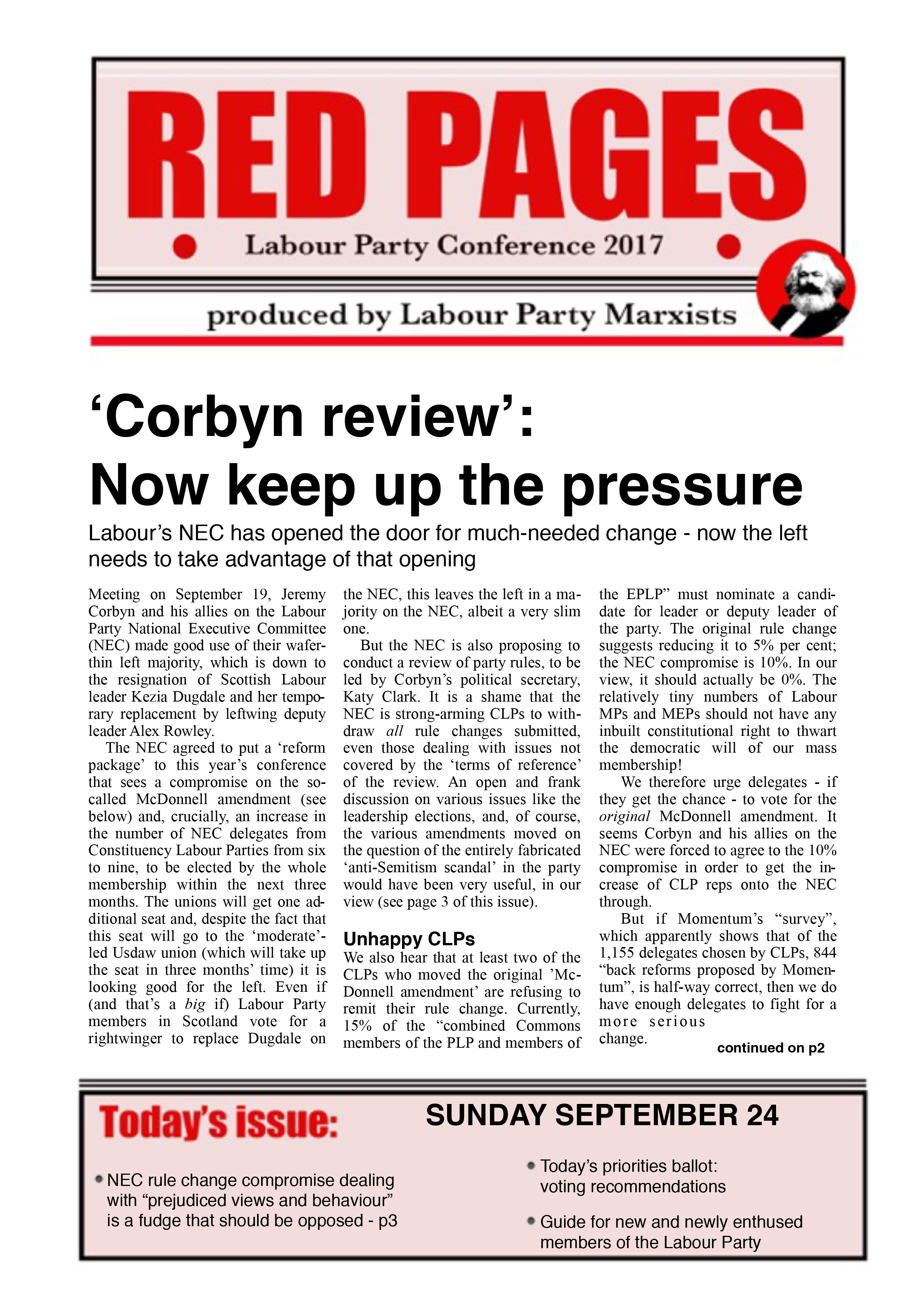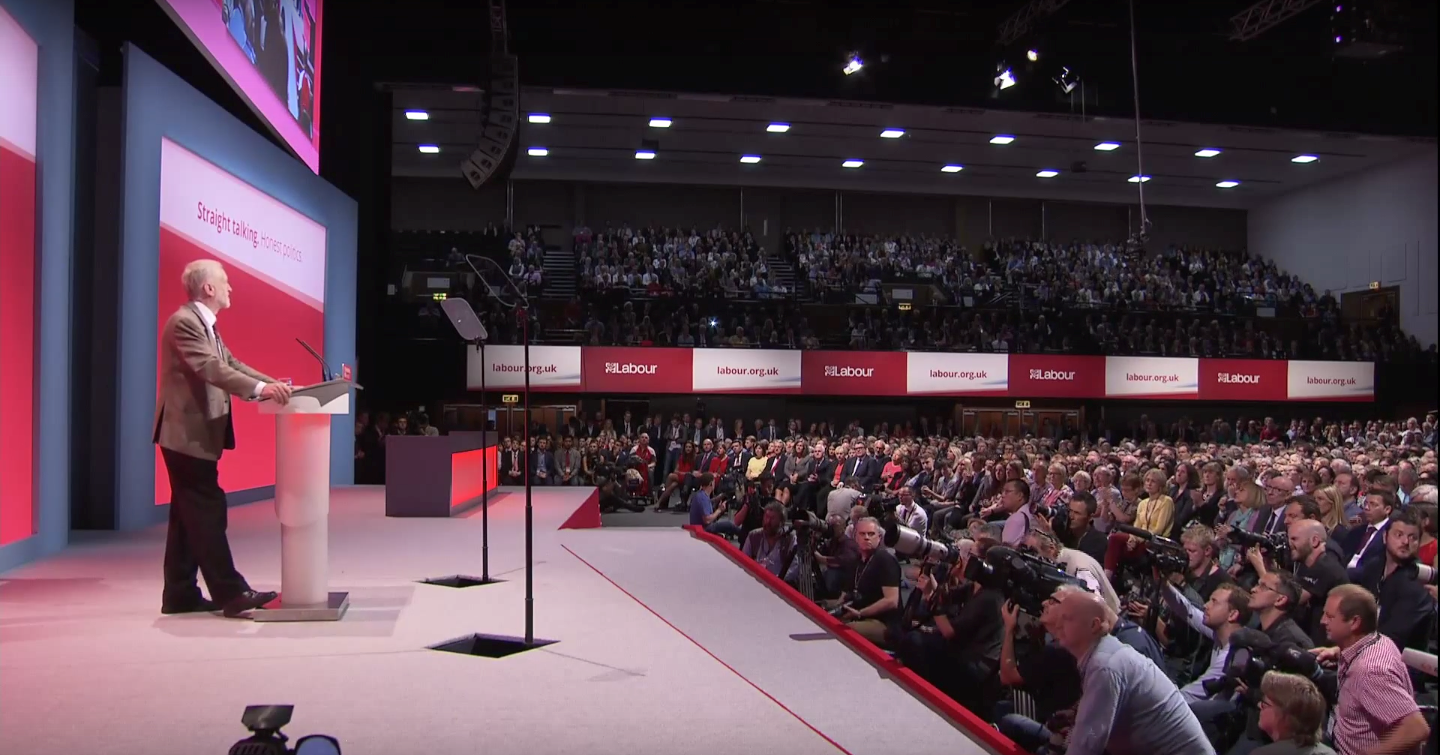Jeremy Corbyn’s election presents the left with a historic opportunity. James Marshall of Labour Party Marxists outlines a programme of immediate action and long-term strategic goals
First the background. Once Jeremy Corbyn got past the gatekeepers of the Parliamentary Labour Party and made it onto the ballot he was always going to be the winner. There are millions out there who are angry, who, no matter how vaguely, want a better world, who feel alienated from and unrepresented by the pro-austerity Labour right. They found their weapon in the person of comrade Corbyn.
Already, even in the early stages, pollsters had him way out in front: eg, on 53%. And, of course, on the very last day, on August 12, when people had their final opportunity to sign up and vote in the leadership contest, the Labour Party’s computer system crashed. It was obvious why. Corbyn supporters were desperately trying to register. So the 59.5% vote came as no surprise to me. Frankly, I was expecting something a little over 60%.
Anyway, there can be no doubting the scale of Corbyn’s victory. He ended miles ahead of Andy Burnham (19%), Yvette Cooper (17%) and Liz Kendall (4.5%). And the fact that Tom Watson, the Brownite deputy leader, only won after three rounds means comrade Corbyn possesses immense authority. So fuck Watson’s doubts over Trident, etc. Our Jeremy gained a crushing first-round mandate in all three categories: registered supporters: 83.8%; affiliates: 57.6%; individual members: 49.6%. To rebel against Corbyn is to rebel against these figures.
Despite that, at the well publicised prompting of Peter Mandelson, Charles Clarke, David Blunkett and above all Tony Blair, the hard right have already launched what will be a protracted, bitter, no-holds-barred struggle to overturn the September 12 result. Blair’s ‘Alice in Wonderland’ opinion piece in The Observer had nothing to do with the former prime minister trying to swing votes in the closing two weeks of the leadership campaign.1 Corbyn had already won. No, its purpose was perfectly clear. Rally the Blairites and their corporate, state and international allies … and declare war.
As I have argued, under present circumstances it is unlikely that the hard right will go for a breakaway. Another Social Democratic Party is an outside possibility. But, unlike the early 1980s, the centre ground is not on the up. At the last general election the Lib Dems were decimated. They remain marginalised and loathed. Hence the Blairites have nowhere to go except the government benches. Being dedicated careerists, they are hardly attracted to that – their constituents would turf them out at the first opportunity. Instead of the glories of high office it would be a suicide jump. Knowing that probable outcome, most of the right will therefore stay put and fight hard … until we send them packing.
The announcement by leading members of the right that they would refuse seats in comrade Corbyn’s shadow cabinet needs to be understood as an act of civil war. Yvette Cooper, Chuka Umunna, Tristram Hunt, Emma Reynolds, Liz Kendall, Shabana Mahmood, Mary Creagh, Jamie Reid, Chris Leslie and Rachael Reeves have in effect constituted themselves a shadow, shadow cabinet. Obviously this parliamentary gang of 10 do not share the same values as the mass of Labour members.
In that context, Corbyn is absolutely right to maintain the power to hire and fire. After all, he faces not just 10 rebels, No, it is more like 100. We Marxists want the abolition of the Bonapartist position of leader.
But these are extraordinary times and require extraordinary measures. The idea of having the PLP electing the shadow cabinet was being touted by the right. But thankfully Corbyn thought twice about his early pronouncements on this subject. Instead he wisely opted to keep the dictatorial approach long favoured by past Labour leaders.
Appointing the shadow chancellor was a litmus test. Many timid leftists as well as members of Corbyn’s inner circle were reportedly urging him to opt for someone from the centre. Instead he chose John McDonnell. Excellent. So there is in effect a Corbyn-McDonnell leadership.
Offering shadow cabinet seats to the likes of Andy Burnham, Hilary Benn, Angela Eagle, Lucy Powell, Lord Falconer, Rosie Winterton and Chris Bryant was always going to happen. Corbyn is a natural conciliator. And the fact of the matter is that there are simply not enough leftwingers in parliament. Unless, that is, Corbyn went for a pocket-sized shadow cabinet and appointed shadow ministers from outside parliament. That is what we LPMers advocated.
Nevertheless, equipped with his left-centre-right coalition, Corbyn can claim the moral high ground. He is reaching out to all sections of the party. Meanwhile, in terms of internal perceptions, it is the hard right that will be blamed for starting the civil war. That will play badly with traditional Labour loyalists. They do not take kindly to anyone damaging Labour’s chances at the polls. After all, for most Labour councillors and would-be Labour councillors, most Labour MPs and would-be Labour MPs, the be-all and end-all of politics is getting into office, no matter what the programme.
However, the hard right will have the full backing of the capitalist media, the City of London, the military-industrial complex and the secret state. And Corbyn’s much publicised admiration for Karl Marx, his campaigning against US-led imperialist wars, his opposition to Nato, Trident and nuclear weapons, his commitment to increase the tax take from transnational corporations, the banks and the mega-rich, his republicanism – even his refusal to sing the royal anthem at St Paul’s – mark him out as completely unacceptable for Labour’s hard right and the business and state establishment.
Of course, the distinct danger is that the Corbyn-McDonnell leadership will have their agenda set for them by the need to maintain PLP unity. Put another way, in what is a coalition cabinet, it will be the right that sets the limits and therefore determines the political programme. Why? Because they are quite prepared to walk. That is what Burnham has indicated over Nato and nuclear weapons. The decision by Corbyn to kneel before Elizabeth Windsor and accept a place on her privy council is therefore more than a symbolic gesture.
Watering down, abandoning, putting principles onto the backburner in an attempt to placate the right, if it continues to happen, will prove fatal. Such a course will demobilise, demoralise and drain away Corbyn’s mass base in and out of the party.
Hence the Corbyn-McDonnell leadership faces both an enemy within the PLP and an enemy within the shadow cabinet. That is why Marxists will, at the first politically appropriate moment, be agitating for the removal of rightwingers from the shadow cabinet. An obvious target being Tony Blair’s old flatmate and co-thinker, Lord Charlie Falconer. He has already threatened to quit over the EU referendum.
Immediate
The left in the Labour Party faces three immediate tasks.
Firstly, there must be a concerted drive to win registered supporters to become full individual members. There are now well over 100,000 of them. If they want to bolster Corbyn’s position, if they want to ensure that he stays true to his principles, then the best thing that they can do is to get themselves a vote when it comes to the national executive committee, the selection and reselection of MPs, MEPs, councillors, etc. Card-carrying members can also attend ward and constituency meetings and vote for officer positions.
Secondly, within the affiliated trade unions we must fight to win many, many more to enrol as Labour supporters. Just over 70,000 affiliated supporters voted in the leadership election. A tiny portion of what it could be. There are 4,414,929 who pay the political levy.2 Given that they can sign up to the Labour Party at no more than a click of a button, we really ought to have a million affiliate supporters as a minimum target.
Thirdly, the constituency, branch (ward) and other such basic units must be revived and galvanised. Everything should be done to encourage new members and returnees to attend meetings and elect officers who oppose austerity and want to support the Corbyn-McDonnell leadership. Labour’s constituency and branches can be made into local centres of organisation, education and action. As such they would be well placed to conduct a mass campaign to get local people onto the electoral register. The election commission estimates that nationally “approximately 7.5 million individuals are not registered”.3
Reorganise
As the hard right begins its civil war, the left must respond with a combination of disciplinary threats, constitutional changes and reselection measures. Those in the pay of big business, those sabotaging Labour election campaigns, those who vote with the Tories on austerity, war or migration, must be hauled up before the NEC. If MPs refuse to abide by party discipline, the whip must be withdrawn. We should democratically select and promote trustworthy replacement candidates. If that results in a smaller PLP in the short term, that is a price well worth paying.
Obviously, the party must be reorganised from top to bottom. A special conference – ie, in spring 2016 – should be called by the NEC with a view to radically overhauling the constitution and rules, and undertaking an across-the-board political reorientation. We need a new clause four, we need a sovereign conference, we need to be able to easily reselect MPs, MEPs and councillors. We also need to sweep away the undemocratic rules and structures put in place by Blair. The joint policy committee, the national policy forums – the whole horrible rigmarole should go.
Clearly it is going to take time to transform the PLP and subordinate it to the wishes of the membership. But with a combination of threat, reselection and rule change it can be done.
A particularly potent weapon here is the demand that all our elected representatives should take only the average wage of a skilled worker. A principle upheld by the Paris Commune and the Bolshevik revolution. From memory even the Italian Communist Party under Enrico Berlinguer applied the partymax in the 1970s. With the PCI’s huge parliamentary fraction this proved to be a vital source of funds.
Our MPs are now on a basic £67,060 annual salary. On top of that, they get around £12,000 in expenses and allowances, putting them on just under £80,000 (yet at present they are only obliged to pay the £82 parliamentarians’ subscription rate). And as leader of the official opposition Jeremy Corbyn has just got himself a £6,000 pay rise.4
We in the LPM say, let them keep the average skilled workers’ wage: say £40,000 (plus legitimate expenses). They should, however, hand the balance over to the party. That would give a considerable boost to our finances. Even if we leave out MEPs from the calculation, it would amount to a roughly £900,000 extra. Anyway, whatever our finances, there is a basic principle. Our representatives ought to live like ordinary workers, not pampered members of the upper middle class. So, yes, let us impose the partymax.
In the three days following Corbyn’s election 30,000 joined the party.5 Many more should be expected. But we need to reach out to all those who are disgusted by corrupt career politicians, all those who aspire for a better world, all those who have an objective interest in ending capitalism. To do that we need to establish our own mass media.
Much to the chagrin of the fourth estate, comrade Corbyn has shown his “contempt” for the capitalist press, radio and TV.6 Relying on them worked splendidly for Tony Blair and Alistair Campbell. But our newly elected leader will get nothing but mockery, hatchet-jobs and implacable opposition. While there will doubtless be an attempt to court The Guardian and the Mirror group, his turning to the social media is understandable and very much to be welcomed. However, tweeting, texting and blogging has severe limits. They are brilliant at transmitting short, sharp and clear messages. But, when it comes to complex ideas, debating principles and charting political strategies, they are worse than useless. To set the agenda we need our own full-range media.
Once we had the Daily Herald. Now we have nothing. Well, apart from the deadly dull Morning Star (which in reality is still in the hands of unreconstructed Stalinites).
We should aim for an opinion- forming daily paper of the labour movement and seek out trade union, cooperative, crowd and other such sources of funding. However, we need to be brave: iconoclastic viewpoints, difficult issues, arguments, must be included as a matter of course. We should also consider internet-based TV and radio stations. With the riches of dedication, talent and ideas that exist on the left, we can surely better the BBC, Al Jazeera and Sky.
Branding people as ‘infiltrators’ because, mainly out of frustration, they supported the Greens, Left Unity or the Trade Unionist and Socialist Coalition in the last general election does nothing to advance the socialist cause in the Labour Party. Such a jaundiced response smacks of the cold-war bans and proscriptions. We should be proud of being a federal party. Therefore securing new affiliates ought to be at the top of our agenda. Indeed we should actively seek to bring every leftwing group or party under our banner. Labour needs to become the common home of every socialist organisation, cooperative and trade union – the agreed goal of our founders.7 In other words, a permanent united front.
Yet sadly, so far, apart from the CPGB, there has been a distinct lack of imagination from those outside Labour. Instead of a banging on the door, there is a cowardly disengagement. A runaway approach designed to preserve sectarian interests and reputations.
Showing his profundity, his prostration before Scottish nationalism, his unconscious English nationalism, the media darling, Tariq Ali, assesses Corbyn’s victory as “England coming to life again”.8 In that same blinkered spirit, he privileges protest politics, as against parliamentary politics. Of course, comrade Ali is one of those freelance socialists: a typical dilettante. The idea of actively engaging in our civil war does not seem to occur to him nowadays.
The same goes for Charlie Kimber, national secretary of the Socialist Worker Party. Our Charlie boasts that he, and his much reduced band of followers, did not take up the opportunity of registering as Labour Party supporters. Why do they impotently stand aloof? After all, a Corbyn vote cost a mere £3 … and for levy-paying members of affiliated trade unions it was gratis. So why did the SWP refrain from giving Corbyn voting support? Comrade Kimber pathetically explains.
The right is set to trigger a firestorm. The PLP is dominated by the right. Corbyn has the active support of no more than 20 MPs. Tom Watson is a Brownite. Lord Mandelson is advising a protracted war. The trade unions are dominated by a self-serving bureaucracy. There will be internal struggles and attempts to introduce constitutional and programmatic changes.9
What ought to be a challenge to join the fight becomes an excuse to opt out.
Having been torn by splits and divisions in the 1970s and then again in the 2010s, the SWP apparatus wants nothing to do with anything that carries even the whiff of factional strife. So, as with Tariq Ali, there is the call for marches, protests and strikes … as counterposed to the Labour Party, PLP battles and taking sides in a concentrated form of the class war. In other words, the SWP stays true to its modern-day version of Bakuninism.
Then we have the Socialist Party in England and Wales. Having wrongly classified, dismissed, the Labour Party as an out-and-out capitalist party since the mid-1990s, it is busily rowing … backwards. The old Militant marker has been cosmetically introduced onto the masthead of The Socialist. Despite that, the politics remain idiotic. Peter Taaffe expects Corbyn to come to him and his floundering Labour Party mark II project otherwise known as Tusc. Showing the same sort of myopic vision as comrade Kimber, SPEW informs us that Tusc will stand against Labour candidates in the next round of council elections. A blundering stance supported by Nick Wrack’s Independent Socialist Network (along with SPEW and the SWP a Tusc
affiliate).
If Tusc stood on something that resembled a Marxist programme, that would be tactically inadvisable under present circumstances. But what passes for Tusc’s programme is barely distinguishable from Corbynism. Despite that, whereas the Corbyn Labour Party will get mass votes, even with many questionable candidates, Tusc will hardly register. Its votes are uniformly homeopathic.
Left Unity, seems to me to be essentially no different. And, as with SPEW and the SWP, LU members are peeling away to join the Labour Party as individuals. Obviously this project, as with all halfway house attempts to recreate the Labour Party, is doomed. Unless it votes for the motions of its Communist Platform, Left Unity has no future.
We Labour Party Marxists unapologetically take our programmatic lead from the CPGB. Having been demanding the right to affiliate since 1920, we demand that the CPGB ought to have the same rights as the Cooperative Party, the Fabians, Christians on the Left, the Jewish Labour Movement, Scientists for Labour, etc.10 However, we also extend that demand to include the SWP, SPEW, LU and all other such organisations.
Then there are the trade unions. Those who have disaffiliated or been expelled must be brought back into the fold. In other words the Fire Brigades Union and the Rail, Maritime and Transport union. They actively supported the Corbyn campaign … from the outside. So, comrades, now do the same, much more effectively, from the inside.
The same goes for unions which have never had an organised relationship with us. Regrettably, Mark Serwotka, Public and Commercial Services union general secretary, was one of those turned away in the Harriet Harman-organised purge. But, instead of impotently complaining about it on Twitter, he should turn the tables on the Blairite apparatus by bringing in his entire membership. Mark, fight to get PCS to affiliate.
I heard him interviewed on BBC Radio 4 on this. He enthusiastically supported Corbyn’s September 15 speech at the TUC. However, he excused himself from getting the PCS affiliated. Apparently it has been illegal for civil servant trade unions to affiliate to the Labour Party since 1927.
When we moved a motion to the effect that all trade union should affiliate to the Labour Party at the last AGM of the Campaign for Labour Party Democracy, we met with exactly that sort of legalistic objections. However, as NEC member Christine Shawcroft, who was sitting next to me, said, “What does that matter?” Here comrade Shawcroft, a close ally of Corbyn, shows the exact right spirit of defiance. Comrade Serwotka and other leaders of non-affiliated trade unions should take her lead. Laws can be defied, laws can be changed. They key, however, it is win the PCS’s membership to want to affiliate. It would be great if the 2016 annual conference was addressed by Jeremy Corbyn and had a raft of branch motions calling for the union to affiliate to the Labour Party.
Reclaiming
Real Marxists, not fake Marxists, have never talked of reclaiming Labour. It has never been ours in the sense of being a “political weapon for the workers’ movement”. No, despite the electoral base and trade union affiliations, our party has been dominated throughout its entire history by career politicians and trade union bureaucrats. A distinct social stratum, which in the last analysis serves not the interests of the working class, but the continuation of capitalist exploitation.
Speaking in the context of the need for the newly formed Communist Party of Great Britain to affiliate to the Labour Party, Lenin said this:
“[W]hether or not a party is really a political party of the workers does not depend solely upon a membership of workers, but also upon the men that lead it, and the content of its actions and its political tactics. Only this latter determines whether we really have before us a political party of the proletariat.
“Regarded from this, the only correct, point of view, the Labour Party is a thoroughly bourgeois party, because, although made up of workers, it is led by reactionaries, and the worst kind of reactionaries at that, who act quite in the spirit of the bourgeoisie. It is an organisation of the bourgeoisie, which exists to systematically dupe the workers with the aid of the British Noskes and Scheidemanns.”11
Despite all the subsequent changes, this assessment retains its essential purchase. Labour is still a “bourgeois workers’ party”. However, with Corbyn’s election as leader, things have become more complex. Labour has become a chimera. Instead of a twofold contradiction, we have a threefold contradiction. The left dominates both the top and bottom of the party.
That gives us the possibility of attacking the rightwing domination of the middle – the councillors, the apparatus, the PLP – from below and above. No wonder the more astute minds of the bourgeois commentariat can be found expressing deep concern about what will happen to their neoliberal consensus.
Notes
1. The Observer August 30 2015.
2. D Pryer Trade union political funds and levy House of Commons briefing paper No00593, August 8 2013, p8.
3. The Guardian February 24 2015.
4. https://en.wikipedia.org/wiki/Salaries_of_ Members_of_the_United_Kingdom_Parliament.
5. International Business Times September 15 2015.
6. See Roy Greenslade in The Guardian September 14 2015. Chris Boffy, online special advisor to the last Labour government, has also been bitterly complaining about Corbyn’s supposed lack of a media strategy – see The Drum September 15 2015.
7.At the 1899 TUC, JH Holmes, a delegate of the Amalgamated Society of Railway Servants moved this resolution:
“That this congress, having regard to its decisions in former years, and with a view to securing a better representation of the
interests of labour in the House of Commons, hereby instructs the parliamentary committee to invite the cooperation of all cooperative, socialistic, trade unions, and other working class organisations to jointly cooperate on lines mutually agreed upon, in convening a special congress of representatives from such of the above-named organisations as may be willing
to take part to devise ways and means for securing the return of an increased number of labour members to the next parliament.” (www. unionhistory.info/timeline/1880_14_Narr_Display. hp?Where=NarTitle+contains+%27The+Labour+ Party%27+AND+DesPurpose+contains +%27WebDisplay%27).
8. The Independent September 12 2015.
9. Socialist Worker September 8 2015.
10. www.labour.org.uk/pages/affiliated- organisations.
11. VI Lenin CW Vol 31 Moscow 1977, pp257-58.
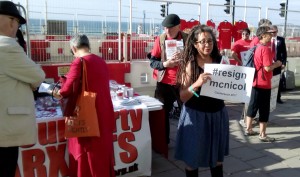
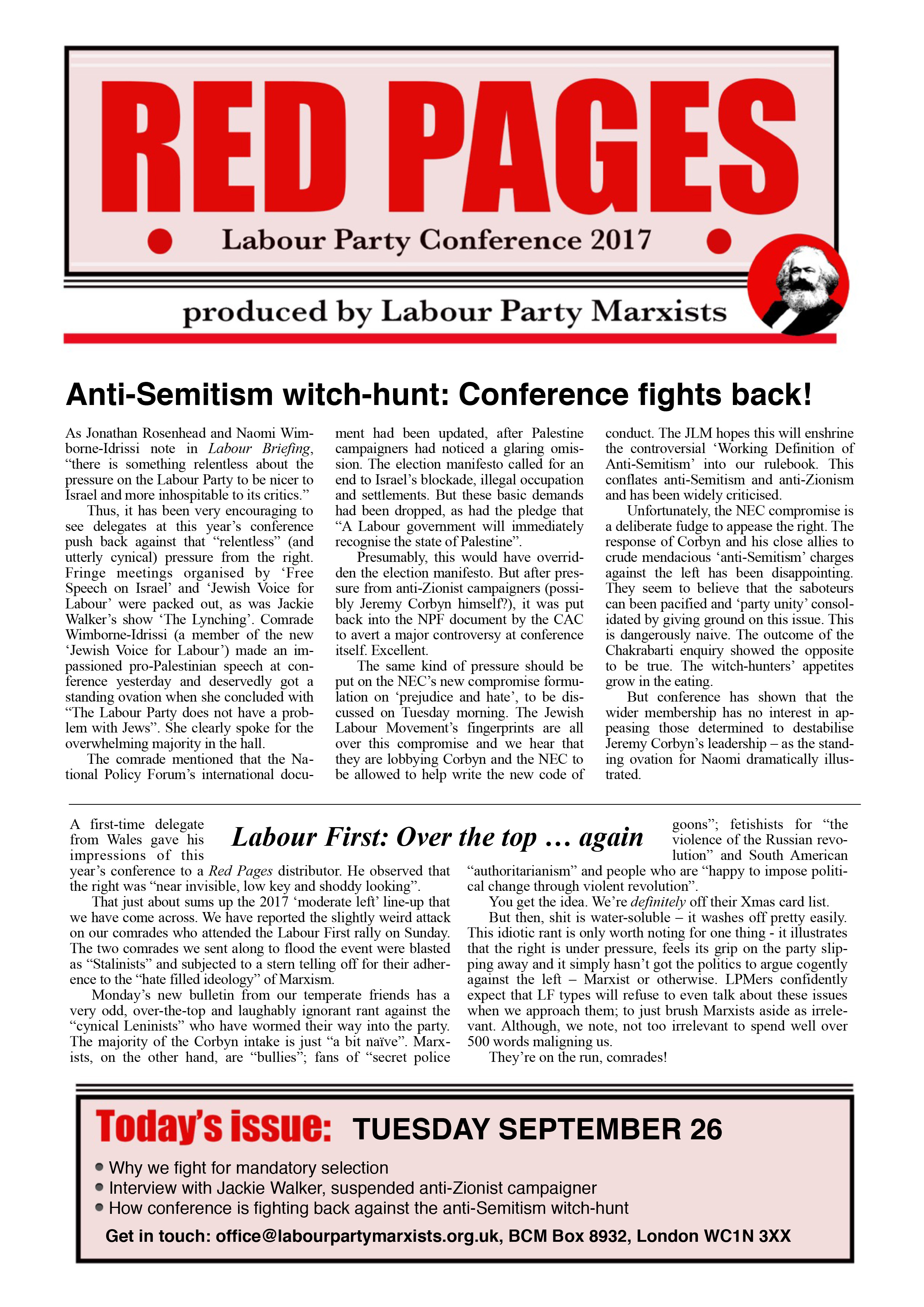
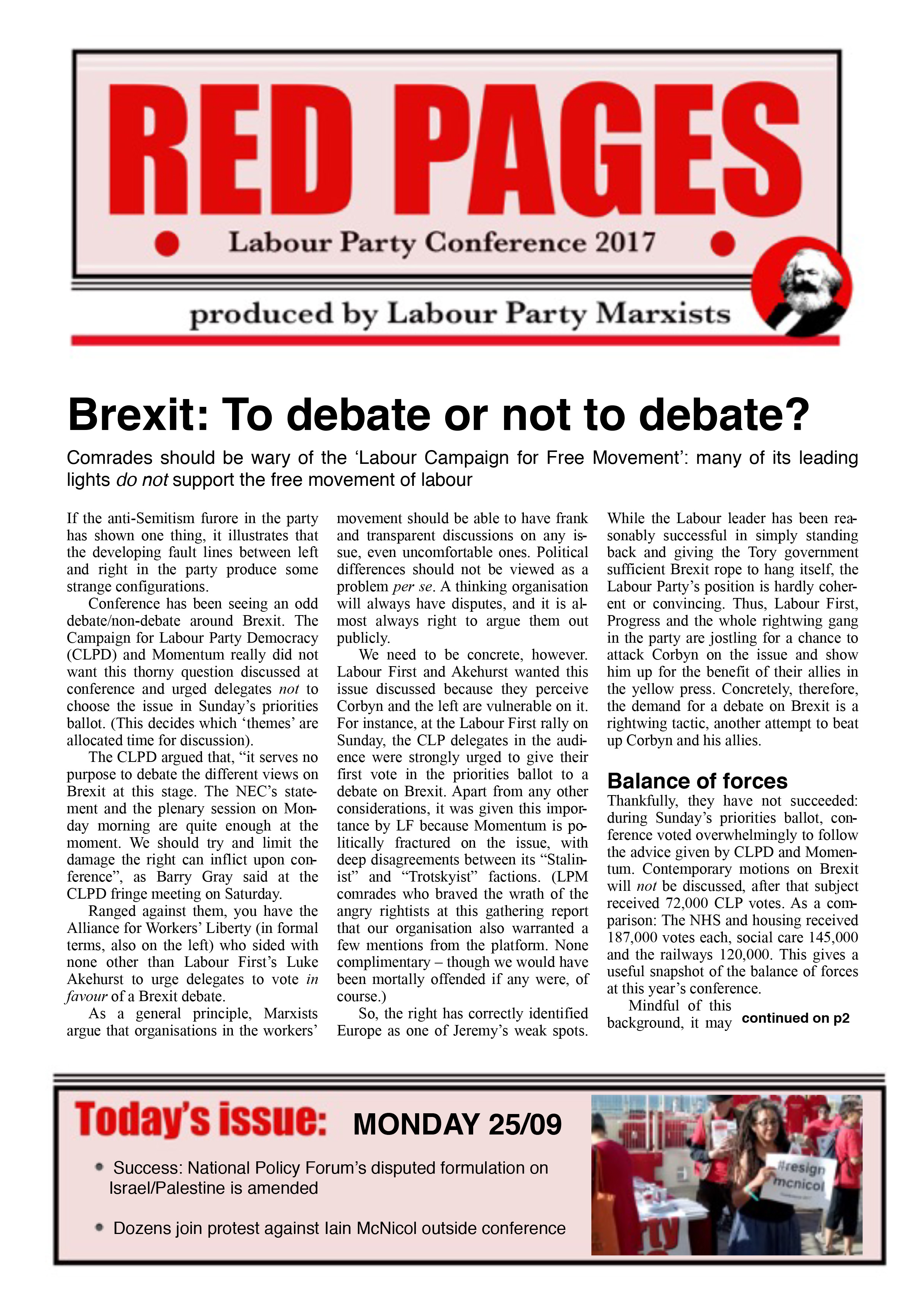
 We need to be concrete, however. Labour First and Akehurst wanted this issue discussed because they perceive Corbyn and the left are vulnerable on it. For instance, at the Labour First rally on Sunday, the CLP delegates in the audience were strongly urged to give their first vote in the priorities ballot to a debate on Brexit. Apart from any other considerations, it was given this importance by LF because Momentum is politically fractured on the issue, with deep disagreements between its “Stalinist” and “Trotskyist” factions. (LPM comrades who braved the wrath of the angry rightists at this gathering report that our organisation also warranted a few mentions from the platform. None complimentary – though we would have been mortally offended if any were, of course.)
We need to be concrete, however. Labour First and Akehurst wanted this issue discussed because they perceive Corbyn and the left are vulnerable on it. For instance, at the Labour First rally on Sunday, the CLP delegates in the audience were strongly urged to give their first vote in the priorities ballot to a debate on Brexit. Apart from any other considerations, it was given this importance by LF because Momentum is politically fractured on the issue, with deep disagreements between its “Stalinist” and “Trotskyist” factions. (LPM comrades who braved the wrath of the angry rightists at this gathering report that our organisation also warranted a few mentions from the platform. None complimentary – though we would have been mortally offended if any were, of course.)
